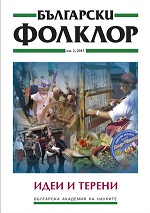„На граничната бразда” – политики, практики, следи в паметта
„On the Border Line” – Policies, Practices, Traces in Memory
Author(s): Nikolay VukovSubject(s): Anthropology
Published by: Институт за етнология и фолклористика с Етнографски музей при БАН
Keywords: border; border policies; practices in safeguarding the border; memory for the socialist period
Summary/Abstract: The author analyzes the various aspects in rethinking and interpreting the so called “southern border” in Bulgaria; the policies and practices related to it during the period of communism; the traces in the memory of individuals and communities in touch with this border for longer or shorter periods of time. With regards to the period prior to 1989, the paper presents the stages in carrying out the policy of safeguarding the “southern border” after the establishment of the communist authority and in placing the border zone under strict surveillance and control; the discourse of propaganda and various ideological practices used to legitimate the safeguarding of the border against trespassers; the creation and functioning of the so called “teams of volunteers” assisting the border patrol in capturing trespassers; various cultural initiatives such as the so called “cultural march to the border”, the clubs “young border patrol”, etc. Most of these practices are additionally viewed from the perspective after 1989 when there were a number of changes in safeguarding the border and in the practices of its crossing and interpreting. The major focus in this section of the paper are the memories and testimonies about safeguarding the “southern border” during the communist period, and the new approaches in rethinking these practices after the political changes. In this way, by the means of the memories about safeguarding the border line, the author delineates the border as a space where the ideological discourse prior to 1989 had found a broad domain for expression, but in addition it was a space where biographies were reshaped, identities were reconfigured and a shared memory was created beyond the horizon of the political messages. The author follows the understanding, shared by Madeline Reeves, stating that introducing “life experience in studying the borders and border zones allows for making a more nuanced and not so much a teleological analysis” of essentially political divisions. For writing the paper the author made use of archival materials and publications on the border from the communist period, testimonies of individuals whose biographies were marked by the touch with the border line as well as Internet forums and specialized sites dedicated to the memories of the border patrol daily life and safeguarding the border prior to 1989.
Journal: Български фолклор
- Issue Year: XXXIX/2013
- Issue No: 2
- Page Range: 186-216
- Page Count: 31
- Language: Bulgarian
- Content File-PDF

